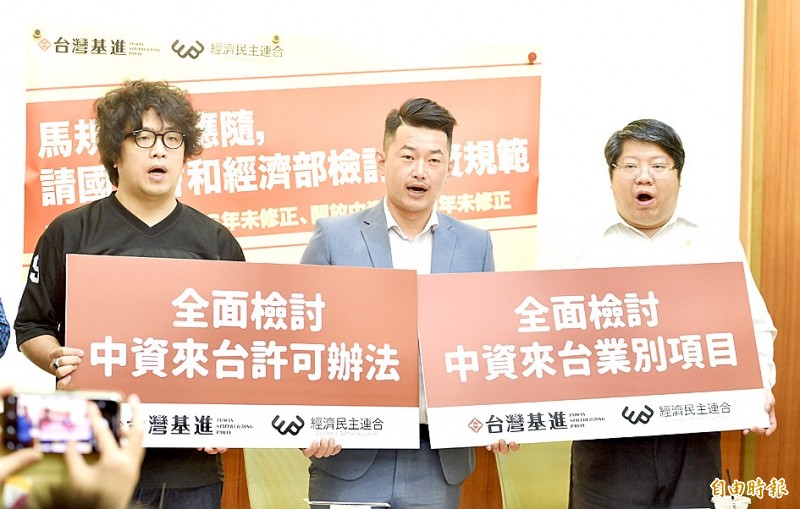《TAIPEI TIMES》Call for laws barring PRC investment

From left, Puma Shen, an assistant professor at National Taipei University’s Graduate School of Criminology, Taiwan Statebuilding Party Legislator Chen Po-wei and Economic Democracy Union convener Lai Chung-chiang hold placards at a news conference in Taipei yesterday. Photo: Lee Jung-ping, Taipei Times
RENEWED PUSH: The government needs to establish an effective oversight mechanism for all Chinese investments coming into Taiwan, the Economic Democracy Union said
By Hsieh Chun-lin and William Hetherington / Staff reporter, with staff writer
Legislative amendments are needed to stop further Chinese capital making its way into Taiwan, the Economic Democracy Union said yesterday in a report.
During former president Ma Ying-jeou’s (馬英九) administration, the Measures Governing Investment Permits to the People of the Mainland Area (大陸地區人民來台投資許可辦法) and other regulations opened up the nation’s economy to Chinese investment, and several loopholes created by those measures have yet to be closed, members of the non-governmental organization told a Taipei news conference.
On April 26, 2009, the Straits Exchange Foundation and the Association for Relations Across the Taiwan Straits met in Nanjing, China, to work out details of an agreement on Chinese investment in Taiwan, and Ma’s government activated the pact’s arrangements on June 30, the report said.
The Measures Governing Investment Permits to the People of the Mainland Area, and the Regulations Governing Permission for People From the Mainland Area to Invest in Taiwan (大陸地區之營利事業在台設立分公司或辦事處許可辦法) took effect a few days later, on July 3, it said.
On July 30, legislators added a clause to the Measures Governing Investment Permits to the People of the Mainland Area to include companies that are headquartered outside of China, but in which Chinese investors held a minimum 30 percent of shares.
In light of the 2014 Sunflower movement, the US-China technology dispute, China’s information warfare, the worsening situation in Hong Kong, and the change of power in 2016 from the Chinese Nationalist Party (KMT) to the Democratic Progressive Party, the government needs to amend laws to limit Chinese investment in the nation, the report said.
The government should also establish an effective oversight mechanism for all Chinese investments, it said.
Ma’s effort to encourage Taiwan-China economic integration set the nation on a path toward political integration, which the public does not want, as shown by the election of President Tsai Ing-wen (蔡英文), while the Sunflower movement was an expression of resistance to Ma’s China-friendly economic policies, the report said.
If the government hopes to reduce the nation’s economic reliance on China it must re-examine the laws, it said.
Trade with China also puts Taiwan at risk of being hurt by US-China trade disputes and US bans on technology exports to China, while investments in Chinese technology have also put the personal information of Taiwanese at risk, the report said.
The changing situation in Hong Kong means the government should also no longer differentiate between investment from China and that from Hong Kong, it said.
The oversight mechanism for Chinese investment is ineffective, and Chinese investors have used overseas Chinese, Hong Kongers and Taiwanese to hide the sources of their investment, the report said.
A more comprehensive investor registration system and stricter penalties for contravening investment regulations are needed to overcome this, it said.
The Economic Democracy Union grew out of the Democratic Front Against the CSSTA (Cross-Strait Service and Trade Agreement), which was organized in April 2013 to fight against the Ma government’s proposed Cross-Strait Agreement on Trade in Services.
That pact was signed on June 21, 2013, but it has never been ratified by the legislature.
新聞來源:TAIPEI TIMES











